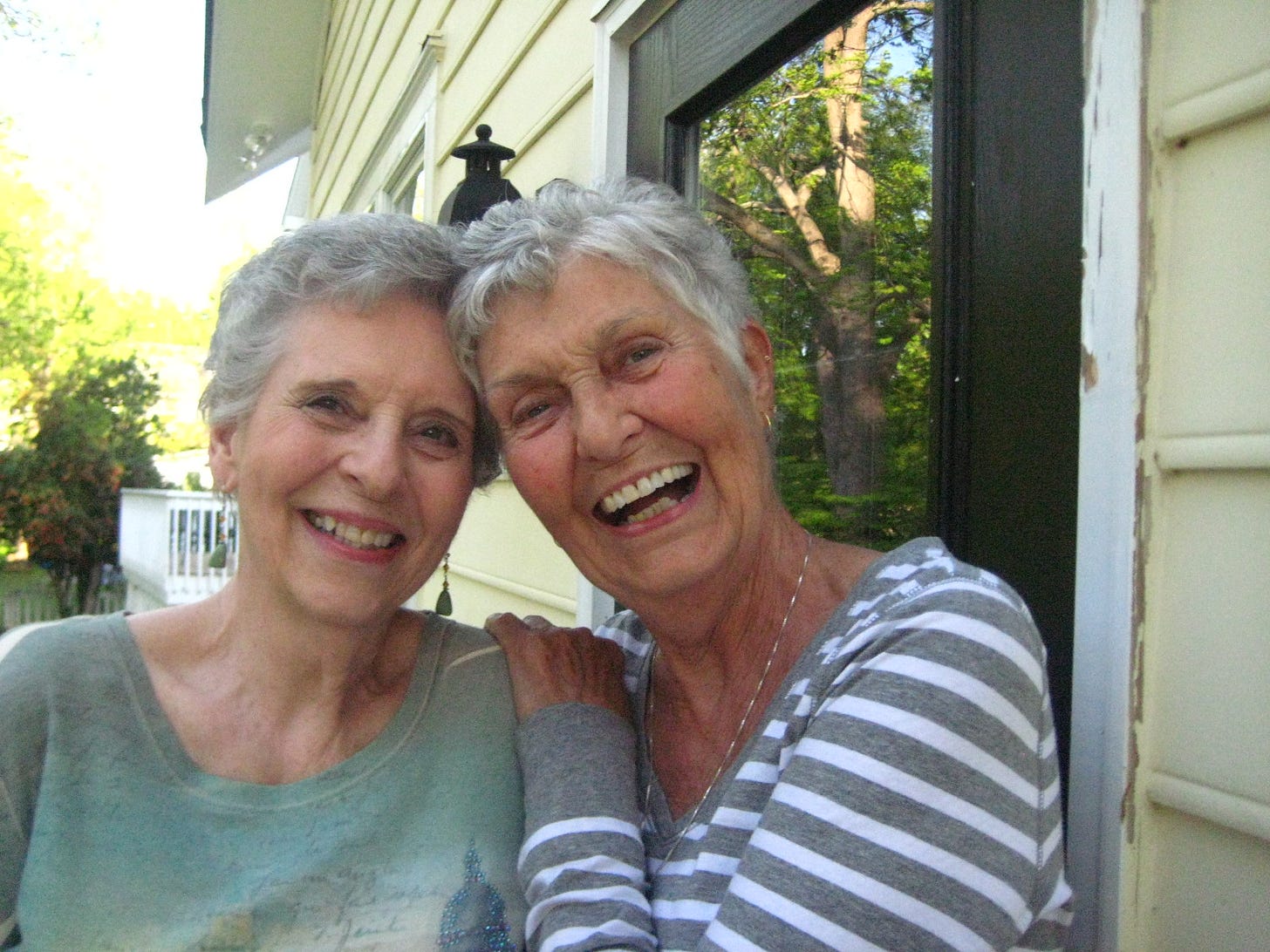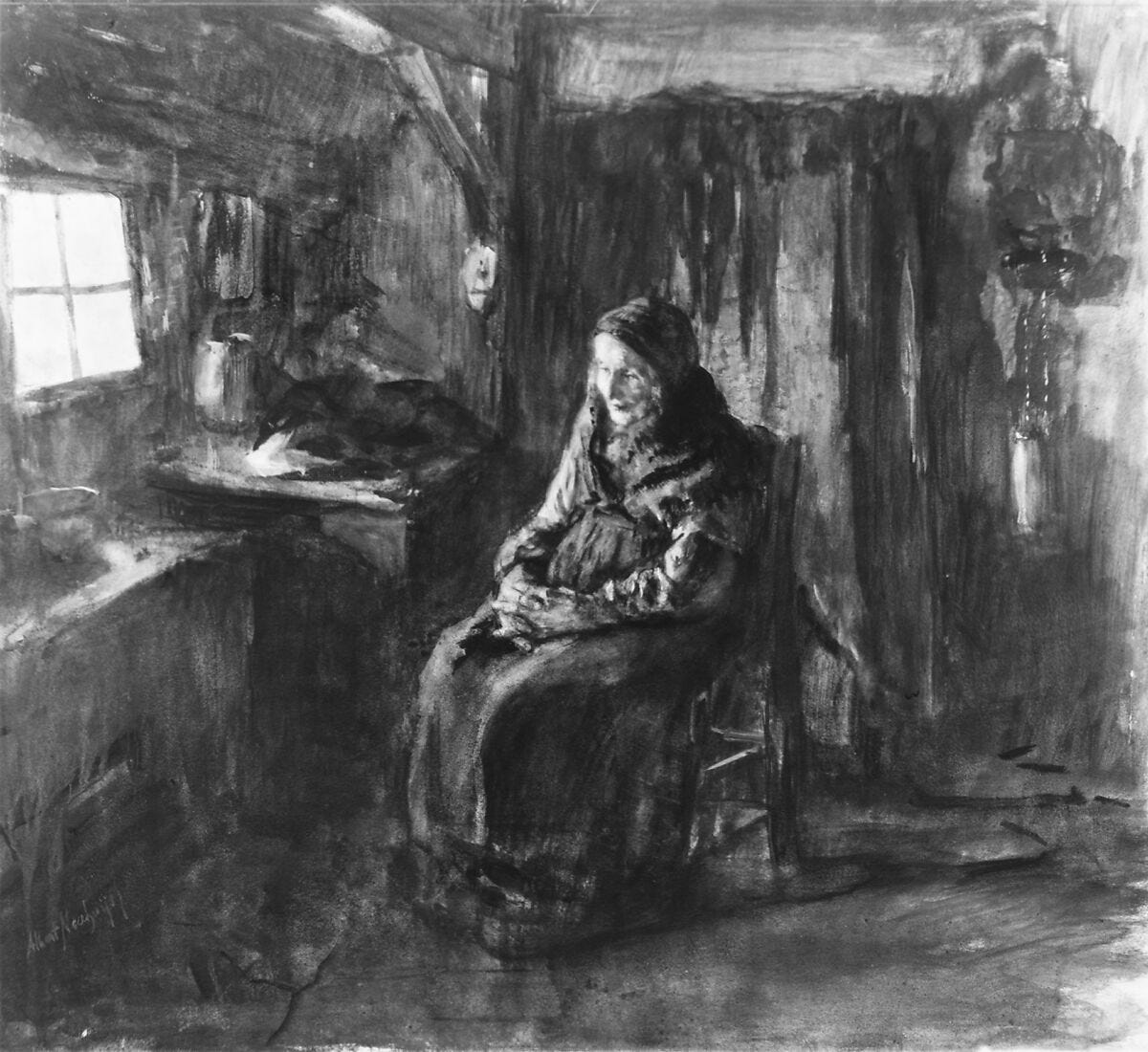My cellular life began inside my grandmother.
This is one of my favorite reproductive facts, which I find very mystical and enchanting. Because baby girls are born with all the eggs they’ll ever have, my mom’s mom carried the cells that produced me. When my mom was in my grandmother’s womb, she got busy creating the egg that would become me.
Maybe it’s not wild to other people, but this tidbit of feminine biology is wild and special to me. When I learned about it, my deep, emotional connection to my maternal grandmother, Ma-Maw, was enhanced on a different plane.
I continue to feel such love and admiration for both of my grandmothers, both of whom have passed away. I wear a gold necklace with two lockets on it that was my maternal grandmother’s. In my imagination, the two lockets symbolize Lucy and Loretta, whom I still think about often, although it has been many years now since they both died. Their affection, joy, playfulness, loyalty, and care were so formative in my life and continue to shape me in ways that I probably don’t even recognize.
My Ma-Maw (Lucy) was particularly a central figure, as she and my grandfather lived an hour away and were very present in our lives. The majority of my most vivid memories of childhood feature her as a leading or supporting character. She was generous and tireless, never sitting down, always tending to someone or feeding them. When she was undergoing cancer treatment, she made seventeen cranberry pies to give to all of her nurses and doctors. She personally kept her hometown Hallmark store in business, as she wrote cards to everyone on every conceivable occasion. (After I gave a eulogy at her funeral, a woman came up to me and said, “You were right about the Hallmark cards. She’d mail my dog a birthday card every year.”)
Ma-Maw doted on me and my siblings. We all had pet names she’d given us at birth. She always called me her “angel.” We were perfect, in her eyes. Even though we most certainly were not, it was a radical, life-altering thing to experience unconditional love like that, especially from a nonparent.
She was funny and joyful, eager and generous, everything you want a grandmother to be. In many ways, I am nothing like her, and yet our differences always made my bond with her feel stronger.
Her death left a profound void in our family. Her loss, not having her in my life, is something from which I don’t think I’ll ever recover. It seems fitting, in a way, to carry this grief for her, to know that it’s not something I’ll misplace.
I believe grandmothers and elderly women are sacred. By this I mean they are holy and deserving of respect. (Yes, everyone is, but I believe there is a special holiness and vulnerability to grandmas that’s worthy of our attention and care.)
I’m in a cranky feminist state these days, and I get particularly riled up when I think about how society regards and discards old women.
After a lifetime, typically, of caring for other people and putting other’s needs ahead of their own, old women are cast aside and unseen by society. It happens early, too, this discarding. Once a woman is perceived as no longer sexually viable, once she passes behind the menopausal veil, she is silly, frivolous, unimportant. A nuisance. An old bag of bones.
We have clearly forgotten how valuable grandmothers are to our survival—to the very existence of our species.
A long-standing biological and anthropological mystery is why women go through menopause. Aside from dolphins and some whales, we’re the only female animals who stop reproducing and yet have years left to live.
Why is this the case? There are many theories, but when we look at the other mammals who are also menopausal, we begin to glean some clues. Dolphin and whale pods fare better when they have old, non-breeding females among them. These “grandmothers” pass down knowledge about hunting and kinship that help keep the pod alive and intact. Because they’re not raising their own young, they’re not as competitive about food and resources and are thus able to help care for others and share their wisdom.
Humans give birth to incredibly vulnerable babies who need a tremendous amount of care from the entire tribe to survive. A baby who only has her parents to rely on might not make it. Allo-parents are essential to survival. Anthropologists have settled on the “grandmother hypothesis” as one of the most plausible reasons to explain the mystery of menopause. Without grandmothers around, investing in childrearing and sharing wisdom, we might not have made it as a species. Grandmothers help raise children, train new mothers, find food, and support the family unit as a whole, along with supporting the entire tribe through the sharing of their wisdom and knowledge.
Today, so far separated from our hunter-gatherer origins, grandmothers are not seen as very valuable, especially in our Western context. What can they contribute to the economy? Aren’t they just drains on the system? What are they for, anyway?
I am eager to recast an imagination for grandmothers in our current disembodied age. Proximity is something that matters here: having grandmothers live nearby seems essential, whenever possible, which is a loss I have written about before.
There is great value and wisdom in elderly women. We have to start opening up to it as a culture.
I think about a letter from Jenna Park about how Korean ajummas (middle-aged married women) dress really boldly and loudly once they approach menopause. They start wearing magenta tracksuits and get big perms and wear blue eyeshadow. They refuse to fade into the background, in other words.
Park writes:
“Instead of acquiescing to societal demands to look young, ajummas just embrace the inevitable reality of aging in a fearless attitude of accepting mid-life. I’ve read that Koreans these days are reacting more negatively to the term, but ajummas have historical and cultural significance and when they are flocked together in groups, dressed similarly in a uniform of quilted vests or gore-tex jackets, visors, and colorful floral prints, they are a force to be reckoned with. They are the opposite of invisible.”
I love this quiet revolt against society’s expectations. I love the refusal to be ignored and discounted.
“The body is not a thing, it is a situation: it is our grasp on the world and our sketch of our project.”
— Simone de Beauvoir, The Second Sex
Currently Reading
Bottoms Up and the Devil Laughs, Kerry Howley
Roman Stories, Jhumpa Lahiri
Eve, Cat Bohannon
Aliss at the Fire, Jon Fosse







This is a particularly meaningful post. I, myself, have become a grandmother in recent years although I hardly feel old enough, I still work, and I still have dependents (i.e. three in college). I can sense that the young moms around me, struggling to find rhythm and order in their lives, oddly cynical and disgruntled about parenting, do not see my 28 years of parenting 6 children as having any relevance to their current situation. I'm ready and waiting to share wisdom, actively trying to not give advice where it is not asked for. Very few are inquiring about how I ran our household, how I raised up 6 truly amazing young adults, how we managed to live on a tight budget, or even how I maintained my sanity. I think there are lots of reasons why the generational sisterhood is not existing in interdependent harmony. As a Christian, I love how the Bible teaches young women and older women to help each other along the way. Older women are told to teach the younger women, which implies, of course, that the younger women look to the older women with respect. Additionally, the Bible over and over instructs us to care for and respect the elderly. Pride and selfishness often discourage human connection. Some older women of today will often say that they have done their time and want nothing to do with coming along side our younger sisters. Maybe that's just a cover for being upset that no one is asking about their experience. The younger women are probably being over confident and therefore not relying on the older women while the older ladies are claiming their older years for self indulgent "me time." The internet feeds this cycle. The young women rely on impersonal, distant bloggers and influencers to get parenting and work/life balance advise. That somehow seems easier than submitting themselves to the less polished, less entertaining, often rambling words of the women around them. At the same time, internet advertising will emphatically tell the more mature set that it's time to live life to the fullest with travel and entertainment, leaving behind the duties of loving and caring for others.
While I feel the dull ache of not being sought out as an older woman for wisdom and tips and tricks, I now have my aging in-laws living across the street. Honestly, I am tempted to see my mother-in-law as irrelevant or somewhat annoying and cast her aside as no longer useful. Your post, as well as some things that she has said lately, are teaching me about my privilege and responsibility to care for her well, to include her as often as I can, and to show her the respect that she deserves. I cannot look down on her for needing help with making reservations, not knowing how to connect her phone with her car, or all manner of tasks that have become so difficult and tedious for her. With joy, I need to slow down and learn to listen, seeking out her stories and experiences.
I have worked for years as a geriatric nurse, counseling families about how to care for their aging loved ones, holding out to them the biblical call to respect and be patient with the elderly. I am now on both ends of the spectrum. I am caring for my own aging family members, while I too am getting old! I have much more sympathy for the families I have worked with in the past. It is NOT as easy as I made it sound!
I hope others find your post as inspirational and thought provoking as I did!
loved this ♥️ As a 73 old, white haired active happy member of the senior set - on the young side as my older compatriots remind me 😂 - I love this. Thanks for the shout out and encouragement. I have my share of invisible and demoted moments, yet my strength and dignity are fierce. I thank my ancestor mothers and draw upon their strength. and stories.